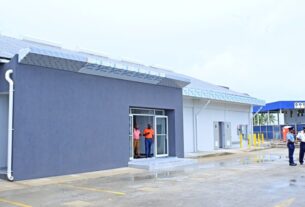BY BGIS | SEP 24, 2020 | TOP STORIES

Barbados unites with the maritime community around the world today, September 24, 2020, to celebrate World Maritime Day. The theme Sustainable Shipping for a Sustainable Planet has been designated by the International Maritime Organization (IMO) to raise awareness of the United Nations (UN) Sustainable Development Goals (SDGs) and to showcase the work that the IMO and its Member States are undertaking to achieve these targets.
Sustainable Development Goal 14 – “Life Below Water” addresses the need to “conserve and sustainably use the oceans, seas and marine resources for sustainable development”. While this is central to both the IMO and the Ministry of Maritime Affairs and the Blue Economy (MMABE), aspects of our work can be linked to all the individual SDGs. Shipping contributes to achieving the SDGs by way of sustainable operations management, influencing and setting requirements for suppliers; and enabling other industries in the ocean space to generate economic growth and work, while protecting natural resources.
We fully endorse taking sustainable approaches to benefit not only the environment and society but the quality of life and livelihoods of Barbados and by extension the planet. This is evident in our “National Policy on International Shipping (Matters of Public Concern): Towards Efficiency, Sustainability, Safety and Security in the Shipping Sector of the Blue Economy” which was approved by the Cabinet in July 2020.
The Policy aims to create a sustainable shipping sector for Barbados in 2020 and beyond – echoing the IMO’s theme – “Sustainable Shipping for a Sustainable Planet.” It is supported by six (6) pillars for shipping – efficiency, clean oceans, safety, security, building resilience against vulnerabilities and governance. My Ministry is currently implementing this Policy and developing the legislation to support the individual pillars, and the overarching goal of the policy itself.
Strengthening the domestic shipping market in a way that helps create balance as well as generate employment opportunities for sustainable economic activities is also of paramount importance. Therefore, having a separate and distinct legal and policy framework for domestic shipping, enables special attention to be given to that industry, thereby lending for a tailor-made policy and legal regime that is sensitive and responsive to the needs of the domestic/small vessels sector. With this in mind and after extensive consultation with our partners in the industry a tailor-made regulatory regime for domestic shipping was developed and approved by the Cabinet for small vessels 150 gross tons and below under the Shipping (Domestic) Vessels suite of laws. Although these suite of laws are in the draft stage, it will ensure that the law is appropriate according to vessel categories, so that smaller vessels are not burdened with onerous requirements which cannot be complied with due to limitations in size, vessel types, areas of operation, and other day-to-day operational realities.
My Ministry also believes that companies and individuals should, as much as possible, be afforded ease in doing business. The maritime single window is one such initiative to facilitate this process. This system which was required to be established in the ports of States which are Party to the Convention on Facilitation of International Maritime Traffic (FAL facilitates just-in-time operations, at the Port of Bridgetown. Benefits of the system include reduction in waiting times for ships at berth; fuel consumption, and increased energy savings for ships; port-area ship-generated emissions; congestion; and earlier time releases for ships, its passengers and crew to engage in other activities, e.g. passenger tours, planned maintenance.
Likewise, at the domestic level, domestic vessels will be electronically facilitated into and out of Barbados through the Sail Clear system established by the Caribbean Customs Law Enforcement Council (CCLEC). Sail Clear will expedite domestic vessels on arrival to, and departure from, Barbados in similar vein to the Maritime Single Window.

These efforts to improve efficiency and safeguard a sustainable maritime sector are consultative and ongoing. In fact, in response to concerns raised by the Barbados Private Sector Association (BPSA) the Barbados Social Partnerships established a Sub-Committee to examine the Performance and Efficiency of the Port of Bridgetown. The Sub-committee, under my chairmanship, has been convening meetings monthly to advance the various tasks identified. One year later, we are pleased to report that there has been some improvement in the delivery rate for cargo through the Port of Bridgetown. In addition, there exists a new established protocol of joint cargo inspections undertaken by the various government agencies which further enhances the delivery times to customers at the Port of Bridgetown. Other transformative projects aimed at growing the maritime industry, improving efficiency and maintaining sustainable shipping efforts – the expansion of the Shallow Draught, the construction of a Boat-Haul out facility and construction of a cruise facilities – are also underway.
We are also taking steps at the more primary level to engage the community through the Ministry’s ‘We Sea,We Life” programme to influence our people, especially the youth to renegotiate their relationship with the sea in a manner that seeks to ensure their safety when in or on the water and equipped them with the skill to earn a living from the sea. In this regard, The Ministry in collaboration with the National Sports Council, has just completed one element of the Programme, the inaugural “Swim for Life” initiative which helped over one thousand (1,000) Barbadian children with basic swimming skills and is currently rolling out another aspect of the programme ‘Sail for Life” teaching sailing skills.
In conclusion, while progress has been made in terms of improving efficiency and protecting our marine resources, there is still much more work to be done as it relates to a number of initiatives geared towards focusing on specific environmental shipping issues. Undertaking precise solutions relative to standardised sustainability will allow the Ministry to approach shipping and the Blue economy in a holistic manner.
Accordingly, I urge you not only in shipping but in all sectors, to take a moment to reflect on the role each one of us plays, the work we do and the important steps we further need to take towards building a sustainable future for Barbados. Understanding the interconnectedness of shipping to tourism; tourism to fisheries and agriculture; and the green to the blue economy is critical to our maritime awareness. It is therefore prudent that we ask ourselves why it matters and what measures can we take at the individual and corporate level, in the private and public sector to achieve a safer, cleaner environment.
We at the Ministry in our strategic pursuit will continue our work in the management and sustainability of marine life and transportation and raising awareness and general improvement across the sector in order to realise our vision of “Sustainable Shipping for a Sustainable Barbados – 2020 and beyond”.
I therefore implore you to play your part towards building a sustainable Barbados for future generations.
I Wish You a Sustainable World Maritime Day!




